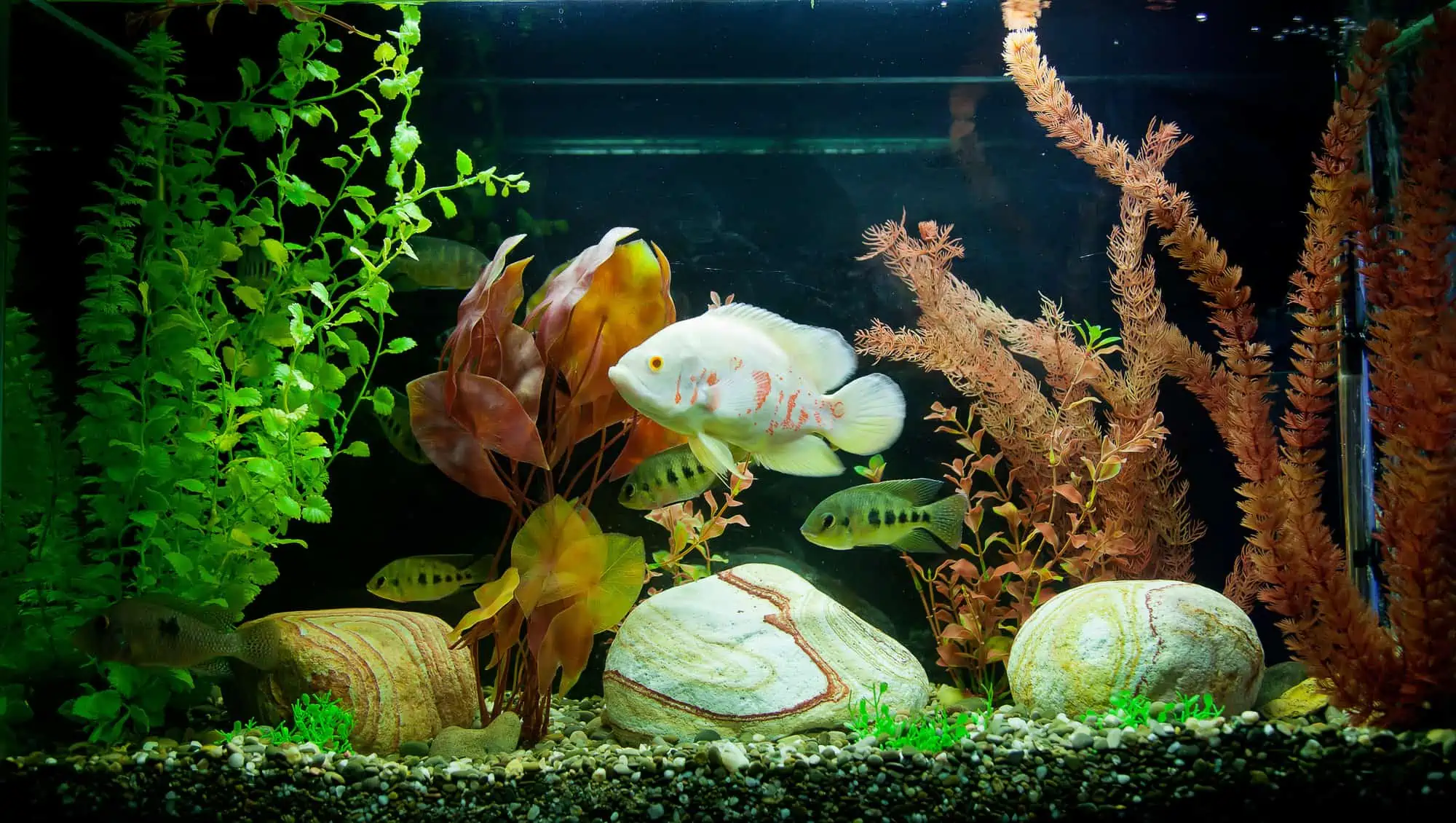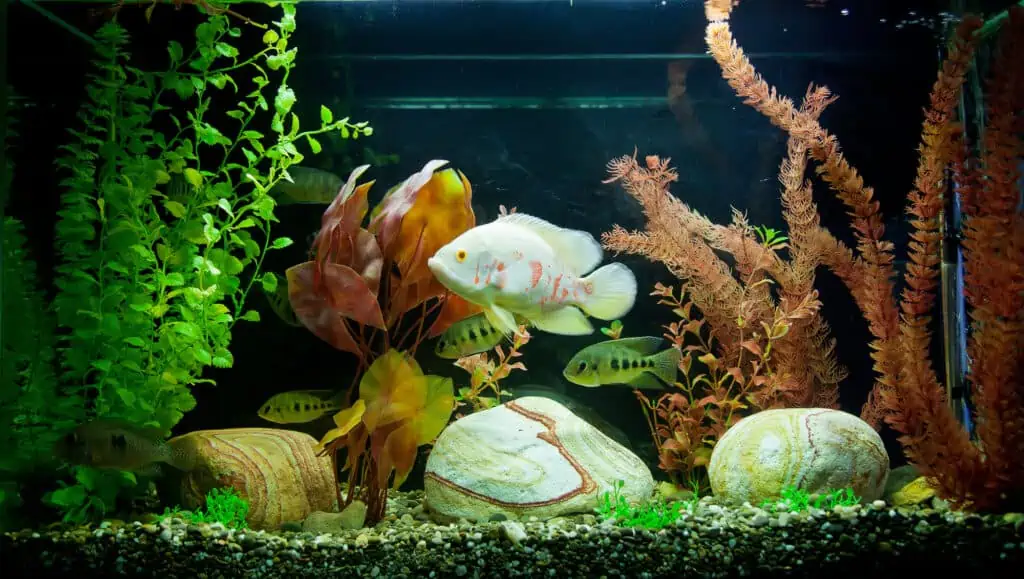All aquarium fish require a reliable filter to live long and healthy lives. A filter malfunctioning or losing power in an outage should be considered an emergency.
Without a filter, detrimental effects on your fish’s health may begin within hours. If your fish are not given any extra help, some may begin to die within one day. Keeping a backup filter handy, therefore, can prove to be a valuable investment.
Here we’ll explain why filters are so essential, and what to do if you find yourself temporarily without one.
Key Takeaways
- Aquarium filters are essential for all types of domestic fish. Without one, fish may begin to suffer within hours.
- The type of fish, size of tank, water quality, stocking density, and the presence of live plants may influence how long your fish can survive without a filter.
- In cases of lengthy power outages or filter malfunction, test your water regularly to ensure the water remains safe. Perform manual water changes to compensate as necessary.
How Long Can a Fish Live Without a Filtration System?
Aquarium fish should never be subjected to a fish tank without a filter for long periods. Leaving a tank filterless for more than a few hours endangers their health and can affect the balance of the tank’s entire ecosystem.
In dire situations, some aquarium fish have been known to live for several days without a filter, but in other cases, they may begin dying more quickly. The length of time they can go without water purification depends on several factors that we’ll discuss in a moment.
How Long Can I Switch Off a Pond Filter?
There’s a lot of debate about whether garden ponds require a filter at all! I’ve seen goldfish living long, apparently healthy lives in medium-sized ponds without a filter, and the larger the pond and less fish you have, the less need for a filter.
In smaller ponds, however, a filter may be necessary to aid the nitrogen cycle and ensure adequate water quality. Similar to an aquarium, small pond fish that are dependent on a filter may start to suffer just hours after the filter is turned off and be at risk of dying a few days later
To find out more about whether outdoor ponds require a filter, aeration, or water features, check out this excellent article on the topic!
What Factors Affect How Long Fish Can Go Without a Filter?
Tank Size
The size of an aquarium has a lot to do with how long fish can go without a filter. Because a small tank has less water volume, the water tends to become dirty and run low on oxygen more quickly.
On the other hand, a larger tank will have a higher water volume, which means the water will stay cleaner for longer due to the increased dilution. Additionally, a larger tank has more stable water parameters, which is better for the fish.
Fish Stocking Density
The more fish you have in your aquarium, the more waste they’ll produce. This means the water will become dirty much quicker, and your fish need a filter to remove the ammonia and other toxins from their environment.
In contrast, fewer fish means less waste and a cleaner aquarium. Plus, they’ll have more space to swim around and be less stressed.
As a result, if your filter stops working, fish in a sparsely populated tank will live longer than those in a crowded tank.
Type of Fish
Did you know that certain fish can breathe air as well as water?
Because fish belonging to the labyrinth family have the rare ability to breathe oxygen from the air, they can sometimes survive longer periods without a filter than other kinds of fish.
Betta fish, paradise fish, gouramis, and some members of the catfish family possess this superpower, so have an advantage over other species in instances of lengthy power outages or filter malfunction.
Tank Maintenance
Proper tank maintenance is key to keeping your fish healthy, whether you have a filter or not. This includes regular water changes and vacuuming the gravel to remove debris and waste.
Tank maintenance also entails ensuring proper water flow to ensure efficient survival for the fish. A robust flow of water is helpful to supply large amounts of dissolved oxygen to water.
On the other hand, weaker swimming fish such as bettas and many cichlids can become dangerously stressed by high water flows, so the right balance is essential.
Water changes help to remove toxins from the water and replenish it with fresh, clean water.
Fish living in a tank that is properly maintained will tend to survive small emergencies such as a filter malfunctioning much better than those living close to the edge of adequate living conditions.
Presence of Other Filtration Methods
Even if you don’t have a mechanical filter, there are other filtration methods you can use to keep your aquarium clean. For example, live plants help to remove toxins from the water and oxygenate it for the fish.
Another option is to use an air stone to aerate the water and create a gentle current.
What Are the Consequences of an Unfiltered Fish Tank?
Build-up of Ammonia and Nitrites
Biological filters fulfill an extremely important role: using beneficial bacteria to convert toxic ammonia and nitrites into nitrates and prevent poisoning of your fish.
Ammonia and nitrites are two of the most common toxins in aquariums, produced chiefly by fish waste and decomposing uneaten food.
With no filter to remove these toxins, they’ll soon build up in the water. At this point, your fish will start to experience health problems. They may become lethargic, stop eating, and have trouble breathing. Ammonia and nitrite poisoning can easily become fatal.
Loss of Oxygen Supply
Atmospheric oxygen becomes dissolved in aquarium water chiefly through movement at the water’s surface.
By creating a water flow, filters produce enough ‘surface agitation’ for plentiful oxygen to dissolve. Without filter flow, the water quickly becomes stagnant and depleted in oxygen.
If you see your fish gasping at the water’s surface, low oxygen levels or ammonia poisoning are the most likely causes.

Algae Blooms
Algae are tiny photosynthetic organisms that live in aquariums. In most cases, a little algae growth is nothing to worry about. However, if the conditions are right, algae can grow out of control, causing an algae bloom.
Algae blooms are a serious problem because they can quickly invade an aquarium, suffocating your fish, plants, and other aquatic life.
What causes algae blooms? Two of the most common reasons are too much sunlight, and dirty water containing too many nutrients.
Without a filter, keeping the water clean and free of excess nutrients is more difficult. As a result, your aquarium is more likely to experience an algae bloom.
When Is It Okay To Turn Off a Fish Filter?
Now that you know how important it is to have a filter for your fish, you might wonder if it’s ever okay to turn it off. By and large, it’s best to keep the filter running at all times. However, there are a few exceptions, including:
Your Filter Is Making a Lot of Noise
It’s possible that the pump is worn out or there isn’t enough water in the tank, which affects the impeller’s operation. In other cases, some dirt may have found its way into the filter’s shaft or impeller.
Instead of turning your filter off, try these tips to make it quieter!:
- Raise the water level in the tank to ensure that the filter is fully immersed and the noise is reduced
- Break down the filter into smaller pieces to clean it based on your user’s manual.
- Make sure all moving parts (chiefly the impeller and impeller shaft) are well lubricated. You can use a petroleum-based jelly such as Vaseline to help with this! From personal experience, I can verify this is a great hack!
Power Outages
Occasional power outages are inevitable. The key to your fish’s survival during this time will depend on the length of the outage, the type of fish, and the water conditions in the tank before the power cut.
If you live in an area with persistent power outages, it’s helpful to get a generator – especially if your fish need a heater.
If the power is off for more than a couple of hours, keep a close eye on your aquarium thermometer and also begin changing your water if there are signs of oxygen depletion or ammonia buildup.
How Can Fish Survive in Their Natural Environment Without Filters?
It’s important to remember that fish in the wild don’t have filters. So, how do they survive?
Well, for starters, most fish live in large bodies of water where there is a constant exchange of water. This means the toxins and waste products are diluted and don’t reach dangerous levels.
FAQs
How Can I Keep My Fish Alive During a Blackout?
You can get a generator or inverter to help your filter, heater, and other appliances run smoothly. Generally, inverters are more cost-friendly for most fish keepers than generators in the long term as they only need batteries, while the latter needs fuel.
If you don’t have a generator, placing blankets over your tank to conserve heat and doing manual water changes are good temporary fixes.
Can Fish Survive Without a Filter for One Night?
Generally, fish can survive without a filter for one night in an emergency. However, don’t leave them without a filter for too long, as this can lead to ammonia poisoning and other health problems.
Be sure to test your tank water in the morning to make sure that ammonia and oxygen levels are in the safe zone.
Last Words
A fish tank filter is essential for every type of fish. How long your fish can survive without a filter depends on the type of fish, their tank size, stocking density, and the water quality.
Just remember, if you’re planning on leaving your fish without a filter for more than a few hours, it’s important to keep a close eye on them and ensure their tank remains a healthy environment for them.


